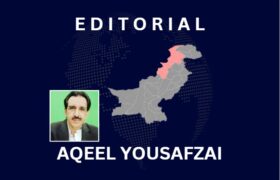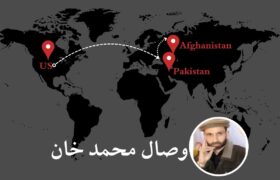The General Election of 2024 in Khyber Pakhtunkhwa (KP) left numerous political analysts and party supporters perplexed, as they witnessed a seismic shift in the electoral in the electoral landscape. Major political parties experienced unexpected defeats in their traditional strongholds. Notably, parties such as the Awami National Party (ANP), Jamaat-e-Islami (JI), Jamiat Ulema-e-Islam-Fazal (JUI-F), Qaumi Watan Party (QWP), Pakistan Muslim League-Nawaz (PML-N), and Pakistan People’s Party (PPP) are among those forced to reevaluate their strategies and positions.
The defeat of JUI-F Chief Maulana Fazlur Rehman in his home constituency (NA-44) of Dera Ismail Khan, for the second consecutive time, epitomizes the startling turn of events. The decline in JUI-F’s representation from 12 to merely six seats in the provincial assembly underscores the party’s unexpected setback. Similarly, ANP, once a formidable force, faced defeats in key constituencies, with even stalwarts like Amir Haidar Khan Hoti, Ghulam Bilour and Aimal Wali Khan failing to secure victory.
Jamaat-e-Islami, known for its strongholds in parts of Malakand division, suffered a significant blow with defeats in Dir Lower and Dir Upper, areas previously considered its bastions. The party’s inability to maintain its grip on these territories signifies a paradigm shift in voter sentiment. Qaumi Watan Party, led by Aftab Ahmad Khan Sherpao, failed to secure a single seat in both national and provincial assemblies for the second time, reflecting a stark decline from its previous electoral performance.
The Pakistan People’s Party Parliamentarian, though managing to secure a few provincial and national assembly seats, experienced setbacks, including the loss of key figures like Muhammad Ali Shah Bacha. Despite marginal improvements in some areas, the overall outcome suggests a challenging road ahead for the party in KP.
The defeat of former Prime Minister Nawaz Sharif in NA-15 Mansehra-cum-Torghar to a PTI-backed candidate further underscores the shifting dynamics, even in regions traditionally loyal to PML-N. This unexpected loss has sent shockwaves through the party ranks, highlighting the need for introspection and strategic reassessment.
The implications of these electoral upsets extend beyond mere numerical losses; they represent a broader disillusionment among voters and a demand for change. The electorate’s rejection of entrenched political players signals a desire for fresh leadership and a departure from traditional power structures. As major parties convene emergency meetings to dissect the election results, one thing remains clear: the political landscape of Khyber Pakhtunkhwa has undergone a seismic transformation, ushering in a new era of uncertainty and recalibration for all stakeholders involved.
The disheartening defeats suffered by prominent political figures like Maulana Fazlur Rehman and Nawaz Sharif underscore the unpredictable nature of contemporary politics. Despite their extensive political experience and deep-rooted connections, these leaders found themselves at odds with an electorate craving change and renewal. The PTI’s ability to capitalize on this sentiment, particularly in regions like Khyber Pakhtunkhwa, highlights the party’s evolving political acumen and organizational strength.
Moreover, the electoral setbacks faced by ANP, JI, QWP, and others raise questions about their relevance and appeal in the current political landscape. Traditional markers of political loyalty and identity appear to be eroding, replaced by a more fluid and dynamic electorate driven by pragmatic considerations and shifting allegiances. This trend signals a fundamental recalibration of power dynamics within Khyber Pakhtunkhwa and underscores the need for political actors to adapt to evolving realities.
In the wake of these electoral upsets, the affected parties must engage in sincere introspection and soul-searching to understand the root causes of their defeat. Whether it be a failure to connect with voters, internal rifts and disunity, or a lack of compelling vision and leadership, these parties must address their shortcomings head-on if they hope to regain relevance and rebuild trust with the electorate.
Furthermore, the 2024 general election serves as a stark reminder of the inherent volatility of politics and the unpredictability of electoral outcomes. No party can afford to rest on its laurels or take its traditional support base for granted. The electorate’s mood can shift swiftly, propelled by a myriad of factors ranging from economic concerns to social dynamics and geopolitical developments. As such, political parties must remain vigilant, adaptive, and responsive to the ever-changing needs and aspirations of the electorate.
In conclusion, the results of the General Election 2024 in Khyber Pakhtunkhwa represent a watershed moment in the region’s political history. The unexpected defeats suffered by major political parties signal a seismic shift in the electoral landscape, characterized by disillusionment, disaffection, and a demand for change. As the dust settles and parties grapple with the aftermath of their electoral setbacks, one thing remains clear: the era of complacency and entitlement is over, replaced by a new era of uncertainty, dynamism, and opportunity.





